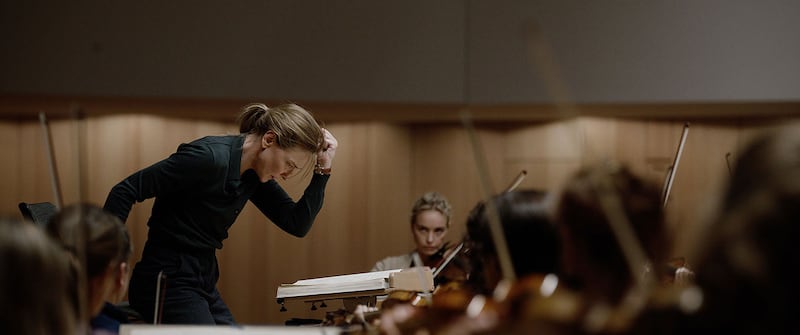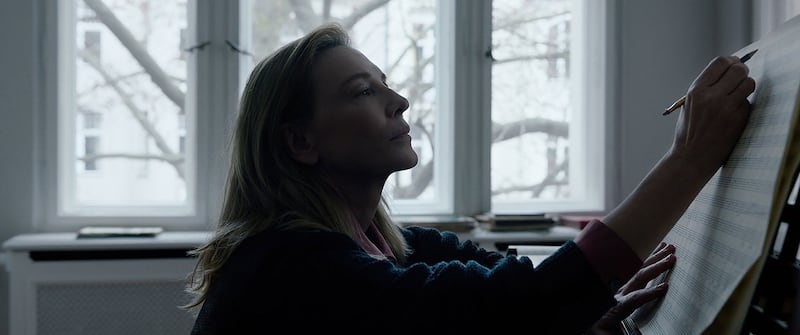You wouldn't necessarily expect a movie like TÁR to have what may be the most shockingly funny ending of the year.
In the film, written and directed by Todd Field, Cate Blanchett plays a prestigious classical music conductor named Lydia Tár, whose downfall unfolds over the course of the nearly two-hour-and-40-minute runtime. It's a movie crammed with weighty topics and references to the likes of Leonard Bernstein, Gustav Mahler, and Jacqueline du Pré. And yet somehow it all concludes with a dash of video game cosplay. You'll be confused. You'll be amused. And your mouth will be agape from the sheer audacity of it.
(Warning: Spoilers follow for the ending of TÁR.)
By the film’s final moments, Lydia is mired in disgrace over a sexual harassment scandal. She loses her position as the principal conductor of the Berlin Philharmonic after she’s accused of grooming and sexual harassment by a woman who committed suicide.

Field doesn’t dwell on Lydia's quote-unquote cancellation, but it’s brutal and public. She storms the stage during a performance of Mahler's Fifth, the symphony for which she had been preparing, tackling the conductor in her place. Her wife (Nina Hoss) won’t let her see their child, and she slinks back to her outer-borough origins, where her family knows her as “Linda” rather than “Lydia.”
But Lydia isn’t done conducting. She takes a gig in an unidentified Southeast Asian country—the sequences were filmed in Thailand—where her sparse accommodations are far from the Placido Domingo suite where she used to stay in New York. She treats the job seriously, asking her instrumentalists to analyze the piece they are playing and studying the score in an outdoor café. And then she performs.
As the musicians start to play the blandly bombastic tune, screens descend from the top of the theater, and a booming voiceover echoes. Field’s camera pans over the crowd watching. They are all in cosplay, wearing headpieces and furry accessories. And then it’s over.
Field never identifies exactly what is going on here on screen, but there is an explanation. This is a Monster Hunter concert. As in the role-playing video game Monster Hunter. You see, Lydia has fallen a long way from Mahler.

Lest you think this is an invention of TÁR itself, the Monster Hunter orchestral performance is actually a very real phenomenon. According to the official website, the first one took place in 2009, and the tradition has grown into an annual affair since then. In footage of the 2021 concert you can see the slightly goofy pairing of people in tuxedos and formal wear seriously playing their instruments as the video cuts to images of elaborate pixelated creatures being pursued by their foes.
It would be tempting to read this conclusion to TÁR as just something of a sick joke on Lydia’s behalf. The movie began with her expounding in front of an audience of New Yorker readers, the kind of folks who could chuckle in recognition when she parrots her mentor Bernstein quoting the Talmud. Now she’s in front of a group of people for whom her presence means nothing. They are there to hear the music, yes, but only as it exists in relation to something else, something which you can only imagine Lydia would have turned her nose up in her previous life. It’s humiliating. And yet there’s something to be said for her persistence, and Field leaves you to wonder whether it’s her ego that has brought her to this place, her financial situation, or maybe an emotion that’s more sincere.
When Lydia is back in New York at her childhood home, she pulls out an old tape of one of Bernstein’s “Young People’s Concerts,” educational programming he made to teach children about great composers. As Lydia watches her expression softens. Something in Bernstein’s dialogue moves her, as she seems to recall the reason she began this career in the first place.

So you have to wonder, when she’s back at the podium conducting the music of Monster Hunter: Is she there because she needs the attention that commanding an orchestra gives her? Or is it because she has the need to play music, whatever that music may be, even at her lowest state? Though Field offers no definitive reading, the answer is: Probably a little bit of both.
But maybe what's most compelling about TÁR's finale is that these are the questions we’re asking. Most debates about a person’s cancellation revolve around what is justifiable punishment for horrible actions. Even if Field is sparing with the actual details of what went down, there’s no doubt what Lydia did was awful and that her career was destroyed as a result. That much is decisive. What Field is more interested in plumbing is just who this person is and how she constructed an identity that made her believe she was invincible. Once that persona has been knocked down, who is she now?
To the Monster Hunter fans, she’s a nobody. To us? Well, that’s more complicated. Once you're done guffawing and wrapping your head around what just happened, that’s when the reckoning starts.





